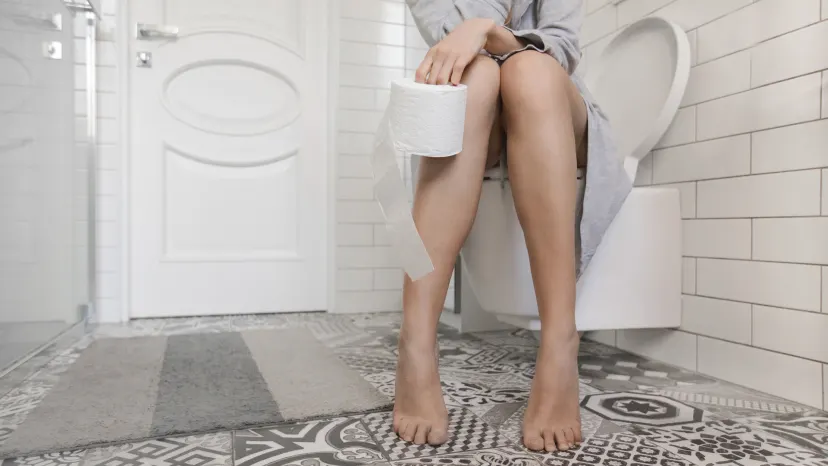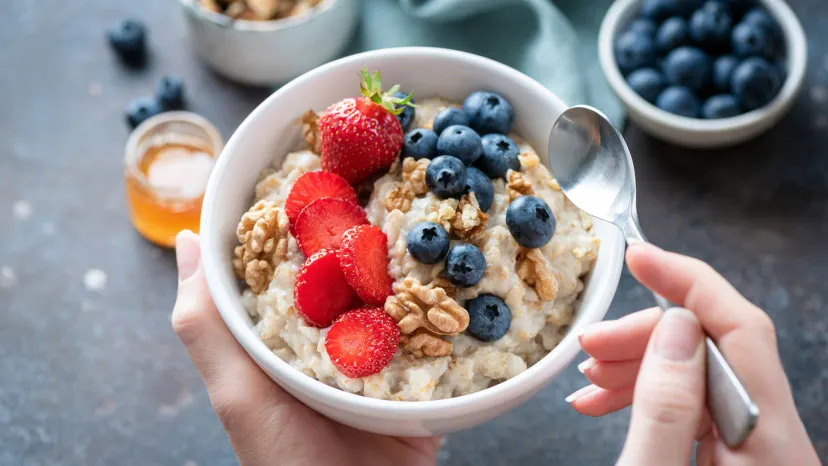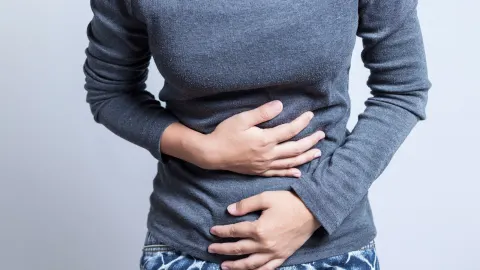Constipation
- What is constipation?
- What are the signs and symptoms of constipation?
- What are the types of constipation?
- Why am I constipated?
- What are the risk factors for constipation?
- How is constipation diagnosed?
- How is constipation treated?
- What are possible complications of constipation?
- When should you see a healthcare provider?
- Can you prevent constipation?
- What is the outlook for people with constipation?
- Living with constipation
- Featured constipation articles
Introduction
Let’s face it—everyone has trouble going to the bathroom on occasion. But if you're experiencing more stop than go when it comes to your bowel movements, it may be time to talk to a healthcare provider (HCP) about constipation.
Constipation affects more than four million people in the United States on a consistent basis. The condition makes it difficult to pass stool comfortably or regularly. This can leave you feeling bloated and sluggish. If left untreated, constipation may lead to complications like rectal bleeding or hemorrhoids.
Getting the facts about constipation can help you better identify its warning signs, pinpoint possible causes, and discover ways to relieve symptoms and improve your digestive health. Read on to learn more about this surprisingly common but treatable problem.
What is constipation?

Constipation is a condition in which bowel movements (BMs) become infrequent or uncomfortable. Stool (or poop) may be unusually hard and require you to strain to pass it, or you may feel like you aren’t able to fully empty your bowels when you use the bathroom. Constipation is responsible for 2.5 million health care visits in the U.S. annually and is the most common type of gastrointestinal (GI) health concern.
While the average number of weekly BMs can vary significantly from person to person, constipation is generally recognized as having fewer than three BMs per week. With that said, defecating (passing stool) anywhere between one to three times per day and two to three times per week is generally considered healthy. If having two or fewer weekly bowel movements is normal for you and you don’t strain to defecate, then you likely don’t have constipation.
Constipation can be acute or chronic (long-term). Acute constipation tends to appear suddenly and is quickly noticeable, while chronic constipation develops slowly and may last for several months or years. Usually, constipation is diagnosed as chronic if you experience two or more constipation symptoms for at least three months.
What are the signs and symptoms of constipation?
In addition to having fewer than three BMs per week (or fewer than your normal number), signs and symptoms of constipation include:
- Uncomfortable BMs that require straining to pass
- Stools that are unusually hard, dry, or lumpy
- A feeling of being unable to fully empty your bowels
- A feeling that there is a blockage in your rectum (the chamber that starts at the end of the large intestine, right after the last part of the colon called the sigmoid colon, and ends at the anus)
- A perceived need to physically help empty your bowels, such as with your fingers or by pressing against your stomach
- Abdominal bloating, cramps, or stomachaches
- Nausea
What are the types of constipation?
Constipation can be secondary or primary. Secondary constipation is the result of another medical condition (see below). Primary constipation is attributed to factors like diet or lifestyle changes. In some cases, the cause of primary constipation is unknown.
There are three main types of primary constipation:
Normal-transit constipation
Normal-transit constipation (NTC) occurs when stool moves through the colon (the longest part of the large intestine) at a typical pace, but hardened stools, bloating, and abdominal pain may still occur. NTC is the most common type of constipation.
Slow-transit constipation
Slow-transit constipation (STC) occurs when stool moves unusually slowly through the colon. This is linked to gut dysmotility, or problems with digestive muscles that impact their ability to contract and efficiently move the contents of your digestive tract through the colon.
Pelvic floor dysfunction constipation
Pelvic floor dysfunction constipation results from an issue with pelvic floor muscles. The pelvic floor sits between the pubic bone and coccyx (tailbone). The muscles involved in defecation consist of muscular bands (sphincters) that encircle the anus. In this type of constipation, the pelvic floor muscles and sphincters responsible for expelling stool from the anus fail to relax and function properly.
Why am I constipated?
If you’re dealing with constipation, you’re probably wondering how you got here. The causes of constipation vary from person to person, but generally speaking, constipation occurs when the colon absorbs too much water from stool, leaving it hard and more difficult to pass. This may happen for several reasons, the most common of which include:
Diet
Fiber is a type of carbohydrate found in foods like whole grains, leafy green vegetables, fruits with edible skins and seeds, nuts, and beans and legumes. Not consuming enough of this nutrient can cause constipation.
Unlike most other carbohydrates, fiber can’t be broken down, so it passes through the colon undigested. Because it slows down the digestion of other carbohydrates, fiber helps prevent blood sugar spikes and controls hunger in addition to encouraging the passage of stool.
Fiber (particularly insoluble fiber, which doesn’t dissolve in water) is viewed as a natural laxative for the digestive tract. It aids in the digestive process by keeping water in stool, which makes it softer, larger, and easier to pass. A low-fiber diet can result in hard, dry stool and constipation.
Consuming too much cheese, milk, and other dairy products is also linked to constipation. According to a review of studies published in Nutrients, constipation occurs in around 30 percent of people with lactose intolerance. Lactose intolerance is a common condition in which a person is unable to properly digest or break down lactose, a sugar found in milk and other dairy products due to a lack of the digestive enzyme lactase. Some people with lactose intolerance develop constipation, while others may experience diarrhea.
Dehydration (a lack of fluid in the body) can also play a role in constipation. Being dehydrated prompts the body to maintain healthy fluid levels in the blood by removing water from stool, causing stool to harden and resulting in constipation.
Medications
Certain over-the-counter (OTC) and prescription medications are known to slow down the action of the bowels and contribute to constipation. These medications include, but aren’t limited to:
- Nonsteroidal anti-inflammatory drugs (NSAIDs) such as naproxen and ibuprofen
- Antispasmodics such as dicyclomine
- Iron supplements
- Antihistamines such as diphenhydramine
- Antacids with aluminum or calcium
- Antidepressants such as amitriptyline and fluoxetine
- Diuretics such as furosemide
- Anticonvulsants such as phenytoin, gabapentin, and clonazepam
- Calcium-channel blockers such as diltiazem, nifedipine, and verapamil
- Anticholinergics such as atropine and trihexyphenidyl
- Bismuth salts
- Antipsychotics such as olanzapine and clozapine
Another type of drug linked to constipation is opioids. These potent prescription pain relievers can trigger or worsen constipation. Constipation occurs in around 90 percent of people taking opioids for cancer pain and around 40 percent of those taking opioids for chronic pain unrelated to cancer.
Excessive or improper use of laxatives (medications that promote easier, more regular BMs) may also cause constipation, although newer laxative formulations are making this problem less likely. Proper long-term use of laxatives (as recommended by an HCP) can help relieve symptoms in people with chronic constipation.
Medical conditions
Constipation is sometimes a symptom or complication of another medical condition. In these cases, it’s known as secondary constipation. Issues that affect the nerves or muscles involved in bowel movements can lead to constipation, as can certain hormonal and GI health conditions.
Some of the most common medical conditions linked to constipation include:
- Irritable bowel syndrome (IBS): This is a common chronic GI condition characterized by abdominal cramping and changes in bowel habits. IBS that occurs with constipation is called IBS-C.
- Diverticular disease: This condition causes small pouches to form in weakened areas of the colon.
- Colorectal cancer: This cancer develops in the inner lining of the colon or rectum.
- Disordered defection (dyschezia): This refers to an issue with the bowels and/or muscles around the anus that prevents stool from easily exiting the body.
- Intestinal obstruction: This refers to a growth in the intestines (such as a tumor or scar tissue) that blocks stool from moving smoothly through the bowels.
- Scleroderma: This uncommon autoimmune disease can reduce stool movement in the intestines in some cases.
- Hypothyroidism: Caused by an underactive thyroid gland, hypothyroidism is characterized by a lack of thyroid hormones that can impact various parts of the body, including the bowels.
- Parkinson’s disease: This is a neurodegenerative disorder that can impact the nerves that control bowel and bladder function.
- Diabetes: This endocrine disease may disrupt fluid levels in the body or damage nerves that control bowel and bladder function.
- Spinal cord injury: Any injury to the spinal cord can impact the nerves that control bowel and bladder function.
- Hypercalcemia: This refers to high levels of calcium in the blood that can lead to upset stomach and changes in bowel habits.
- Other problems with the digestive tract or pelvic floor muscles: Structural defects in the digestive tract such as a fistula (a tunnel that forms between the skin near the anus and the end of the bowels) or issues with pelvic floor muscles can disrupt how stool moves through the intestines and exits the body.
Because physical activity is key to good digestive health, any illness that requires long periods of rest has the potential to slow movement in the bowels and leave you feeling constipated.
Pregnancy and constipation
Pregnancy is also associated with constipation. Around 15 to 29 percent of people experience constipation at some point during their pregnancy, according to Cleveland Clinic, particularly during the third trimester. Rising levels of the hormone progesterone tend to relax the bowels and slow the movement of stool. A growing fetus can also weigh down the uterus and place pressure on the bowels.
Lack of physical activity
Physical activity helps the colon move stool along and improves muscle tone around the diaphragm and abdominal wall, which can also improve digestive regularity. If you live a sedentary lifestyle that doesn’t involve much exercise, you’re more likely to experience constipation. Regular physical activity is especially helpful in preventing and treating constipation in older adults.
Other lifestyle factors
Constipation is linked to a wide range of lifestyle factors, including:
- Changes in routine, such as when you travel, start a new job, or alter your sleep schedule
- Stress, which may involve the gut-brain connection
- Repeatedly resisting the urge to use the bathroom
What are the risk factors for constipation?
Having one or more of these constipation risk factors may increase your likelihood of experiencing the condition:
- Being assigned female at birth
- Being older than 65
- Being a child (constipation is responsible for around one in every 20 healthcare visits among children, according to the American Academy of Pediatrics)
- Living a sedentary lifestyle
- Not consuming enough fiber or fluids
- Taking certain medications and supplements, including some common OTC products like antacids, iron supplements, and NSAIDs such as ibuprofen and naproxen
- Having certain medical conditions, including GI, endocrine, or neurological disorders that can affect the colon or rectum
How is constipation diagnosed?
Diagnosing constipation usually begins with a series of questions from your HCP, who will likely ask you about:
- Your bathroom routine, including how many times per day or week you typically go and how this may have changed over time
- Other possible symptoms you may be experiencing, such as nausea or an upset stomach
- The appearance and consistency of your stool
- Your personal and family medical histories, such as if you or someone in your family has irritable bowel syndrome or another GI health condition
- Your diet, including what foods you eat and how much water you typically drink
- Any stressors or major life changes you’ve recently experienced
- How often you exercise
From there, your HCP may perform a physical exam. This might involve gently feeling your abdomen for swelling or tenderness and using a stethoscope to listen to your intestines.
In some cases, your HCP may perform a very brief rectal exam using a gloved finger to check for abnormalities like masses. Depending on your symptoms and medical history, you may be referred to a gastroenterologist—a medical doctor who specializes in diagnosing and treating GI disorders like constipation.
Tests for constipation
A physical exam and review of symptoms is typically all that’s needed to diagnose constipation. But because constipation is sometimes a symptom of another medical condition, your HCP may order tests to check for or rule out any underlying problems. These tests might include:
Lab tests: A stool test can uncover signs of cancer and infection. Tests that examine blood and urine can detect evidence of diabetes and hypothyroidism.
Imaging tests: Imaging methods like X-rays, magnetic resonance imaging (MRI), and computed tomography (CT) scans of the abdomen are sometimes used to produce pictures of the intestines and to check for possible causes of constipation, such as blockages.
Lower GI series: Also referred to as a barium enema, a lower gastrointestinal (GI) series screens for abnormalities in the end of the small intestine, the colon, and the rectum. The procedure involves administering barium—a fluid that coats organs and helps them show up on an X-ray—into the rectum via an enema. (An enema is an injection of fluid into your rectum via a small tube inserted into the anus.) A series of X-ray images are then taken of the lower GI tract.
Colonoscopy: This common diagnostic procedure involves inserting a thin, lighted instrument with a camera on the end into the anus to examine the entire colon.
Sigmoidoscopy: Similar to a colonoscopy, a sigmoidoscopy uses a thin, lighted instrument that’s inserted into the anus to examine the rectum and the lower part of the colon.
Colon transit study: This test evaluates how food moves through the colon. There are several methods, but one common approach involves swallowing capsules that contain a small recording device or X-ray marker. How the capsules travel through the colon is recorded over the course of three to seven days and is viewed on an X-ray to help HCPs understand the movement of food and waste through your GI tract.
Anorectal manometry: During this diagnostic procedure, a thin, flexible instrument with a deflated balloon on the end is inserted into the anus and rectum. The small balloon is then inflated and gently pulled out. This allows the HCP to assess the function of the anal sphincter muscles, which control the release of stool.
An anorectal manometry is sometimes performed alongside a balloon expulsion test, which involves measuring how long it takes to push a small, water-filled balloon in the rectum out of the anus. An electromyography (EMG), which uses electrodes to evaluate the nerves and muscles of the pelvic floor and anal sphincter, may also be recommended
Defecography: A defecography incorporates MRI or X-ray technology to assess muscle coordination and function around the anus. A small amount of barium paste or contrast gel (which is visible on imaging tests) is inserted into the rectum. The person then passes the substance as they would stool. This can help identify problems like rectal prolapse, a condition in which parts of the rectum or large intestine protrude from the anus.
How is constipation treated?

Finding the best constipation treatment for your needs will likely require some trial and error since the condition can be caused by a wide range of medical and lifestyle factors. In general, the most common approaches to treating constipation include:
Increased fiber intake
Eating more fiber helps relieve constipation in many cases. Certain types of soluble (dissolvable) fiber adhere to water and work to soften stool, while insoluble fiber tends to stimulate movement in the digestive tract. Fiber may also act as a prebiotic (a type of fiber that feeds and stimulates the growth of healthy gut bacteria), which can help form stools that are easier to pass by increasing water levels in the intestines.
Most people in the U.S. consume around 15 grams of fiber a day, though adults need at least 25 to 35 grams daily. To assess how much fiber a child needs in a day, take their age and add between five to 10 grams (for example, a five-year-old should consume around 10 to 15 grams of fiber daily).
To increase your fiber intake, try incorporating more of these foods into your diet.
Vegetables:
- Beets
- Broccoli
- Kale
- Green peas
- Spinach
- Corn
- Cabbage
- Brussel sprouts
- Carrots
- Skin-on potatoes
- Butternut squash
Fruits:
- Unpeeled apples and applesauce
- Oranges
- Dried figs
- Dates
- Cooked prunes
- Pears
- Kiwis
- Raspberries
- Blackberries
- Mangos
- Papayas
- Avocados
- Blueberries
Whole grains:
- Whole-grain bread
- Wheat bran muffins
- Popcorn
- Whole-grain granola
- Oatmeal
- Brown rice
- Quinoa
- Whole-grain cereals
Legumes, beans, nuts, and seeds:
- Nuts (such as almonds and walnuts) and nut butter
- Chia seeds
- Baked beans
- Lima beans
- Garbanzo beans (chickpeas)
- Pinto beans
- Kidney beans
- Black-eyed peas
Before enjoying your favorite fiber-rich foods, remember that suddenly and drastically increasing your fiber intake can cause uncomfortable cramping, bloating, and gas. To minimize these side effects, try gradually incorporating more fiber into your diet and drink plenty of water when eating.
Gut-friendly lifestyle choices
In addition to eating more fiber, there are several gut-friendly self-care measures your HCP will likely recommend if you’re dealing with constipation. These include:
- Getting more exercise—a simple walk after a meal can help improve digestion
- Drinking more water
- Avoiding or limiting processed meats and fried foods
- Avoiding or limiting dairy products if you’re lactose intolerant
- Avoiding or limiting dehydrating fluids that can lead to constipation, such as coffee, tea, alcohol, and sugary drinks
- Promptly using the bathroom when you feel the urge to go
- Using a low foot stool to raise your feet when sitting on the toilet
- Trying an OTC fiber supplement (with your HCP’s guidance)
If you’re taking a medication or supplement that’s associated with an increased risk of constipation, your HCP may recommend trying another option or changing dosages.
Laxatives
Laxatives are a type of medication that help make bowel movements easier. Some are developed for long-term use, while others should only be taken for short periods of time. Carefully follow your HCP’s or pharmacist’s instructions when using a laxative.
There are several types of laxatives, including:
- Stimulants: Laxatives like bisacodyl, phenolphthalein, lubiprostone, and anthraquinones contain irritants that help stimulate the large intestine and encourage stool movement.
- Bulking agents: Bulking agents such as psyllium and bran help stool absorb water, increasing bulk and softness and making it easier to pass.
- Osmatic agents: Osmatic agents like magnesium citrate, polyethylene glycol, lactulose, and oral magnesium hydroxide help stool travel through the colon by increasing intestinal secretions and encouraging bowel movements.
- Stool softeners: As their name suggests, stool softeners like mineral oil and docusate work by progressively softening stool. This can make them easier to pass without straining.
- Mu-opiod receptor antagonists: Laxatives like naloxegol, naldemedine, and methylnaltrexone are used to address opioid-induced constipation that doesn’t improve with other approaches. These laxatives work by hindering the effects of opioids in the bowels.
Other medications for constipation
There are a handful of prescription medications that can help treat constipation (particularly in those who have irritable bowel syndrome) but work differently than a laxative. These include:
- Linaclotide
- Plecanatide
- Prucalopride
Your HCP may recommend one of these constipation medications based on your symptoms, medical history, overall health, and other individualized factors.
Enemas
Enemas treat constipation by physically flushing out stool with water. Small-volume enemas, which resemble a small squirt bottle, are available over the counter. This method involves carefully inserting the tip of the enema into the anus, then squeezing the bottle or using another attached device to push water into the rectum. This helps soften and break up the stool, which is then passed along with the water. In rare cases, large enemas called colonic enemas may be used to treat very severe cases of constipation (known as obstipation).
Biofeedback training
Chronic constipation caused by structural problems of the rectum or anus (anorectal dysfunction) may be addressed with biofeedback therapy. During this treatment, a specially trained therapist uses strategic exercises to teach you how to tighten and relax the pelvic floor muscles responsible for releasing stool.
Surgery for constipation
Although uncommon, surgery may be recommended in severe cases of chronic constipation that do not improve with other treatment methods.
Surgery is sometimes performed to address certain underlying causes of constipation, such as:
- Intestinal blockages
- Colorectal cancer
- Intestinal or anal strictures (a narrowing of the intestines or anal canal)
- Anal fissures (a small tear in the anal lining)
- Rectoceles (a collapse of supportive tissue between the vaginal wall and rectum in people assigned female at birth)
A section of the colon may be surgically removed if stool continually moves through it too slowly, although this is rare.
In some cases of fecal impaction (in which stool becomes so hardened that it becomes stuck inside the rectum), an HCP must use a gloved finger to gently break up and remove the impacted stool through the anus. This procedure is performed using a numbing agent or a stronger form of sedation.
What are possible complications of constipation?
Chronic constipation that’s left untreated is not only uncomfortable, but it can lead to complications. Some of the most common include:
- Hemorrhoid problems: Straining to pass stool can place excessive pressure on the blood vessels around the anus, leading to swollen and enlarged veins called hemorrhoids.
- Anal fissures: The skin around the anus can develop small tears from passing very hard stools, causing bleeding.
- Fecal impaction: Chronic constipation can cause large amounts of hardened stool to collect in the lower colon and rectum. Medical intervention is necessary to help the person pass the stool.
- Rectal prolapse: Straining from constipation may force a small amount of intestinal lining to come out of the anus.
- Diverticular disease: The relationship between diverticular disease and constipation goes both ways—diverticular disease (which involves damage to the intestinal walls in the form of balloon-like sacs) can be a cause and complication of constipation.
The gut-brain axis (GBA) is the two-way communication network that connects the brain and GI tract. They communicate via the central nervous system (including the brain and associated nerves), autonomic nervous system, enteric nervous system (located in the GI tract), and the hypothalamus-pituitary adrenal axis (the body’s main stress-response system).
Thanks to the interaction that occurs along the GBA, constipation and other forms of digestive distress may be affected by emotions such as anxiety, anger, sadness, and stress. This is why nervousness sometimes triggers “butterflies” in your stomach or why receiving upsetting news might leave you feeling nauseous.
When should you see a healthcare provider?
No one looks forward to sharing details of their bathroom habits with an HCP, but it’s important to be candid about any GI changes you experience. Seek medical care if you experience frequent or persistent constipation.
Many GI issues like constipation are common and HCPs are trained to help people find relief from these conditions. Delaying medical care for constipation could make the problem worse and increase your risk of experiencing complications.
As a general rule of thumb, you should speak with your HCP if you notice any unusual, persistent changes in your bowel habits. Using a constipation symptom journal to keep track of your BMs and how certain foods or behaviors influence them can provide helpful insight to you and your HCP.
It’s especially important to seek prompt medical care if any of the following issues associated with constipation occur:
- Unintended weight loss (usually losing more than 10 pounds or more than 5 percent of your body weight over a period of 6 to 12 months or less)
- Vomiting
- Abdominal swelling
- Rectal bleeding
- Blood in stool
- Lower back pain
- Intense stomach pain
- An inability to pass gas
- Severe constipation in an older adult
What questions should you ask your healthcare provider?
Starting a conversation about constipation or its treatment may feel awkward, but being open with your HCP and asking questions can help you make confident, educated decisions about your care. Here are a few basic questions to get you started:
- How can I help my body have regular bowel movements?
- How many bowel movements should I have per day or week?
- What exactly is causing my symptoms?
- How can changing my diet improve constipation?
- How can I incorporate more fiber into my diet?
- How much water or other fluids should I aim to drink every day?
- What foods or behaviors should I avoid?
- Which of my medicines or supplements can cause constipation?
- If my initial constipation treatment doesn’t work, what should I try next?
- When should I call an HCP about constipation?
- Do I have a high risk of experiencing constipation complications?
Can you prevent constipation?
Everyone gets a little stuck on occasion, but keeping these simple constipation prevention tips in mind can help you stay regular and avoid more serious bouts of constipation:
- Make sure you’re getting enough fiber in your diet by eating plenty of whole grains, fruits, leafy green vegetables, beans, legumes, and nuts.
- Stay active and exercise regularly—even a simple walk around the block is beneficial for your digestive system.
- Be sure to hydrate well by drinking enough water. Eating water-rich fruits such as watermelon, cantaloupe, peaches, and berries can also help you stay hydrated.
- Don’t ignore the urge to use the bathroom. If you have to go, go.
- Try to keep stress in check. Consider incorporating stress management techniques like meditation, journaling, yoga, and deep breathing exercises into your daily routine.
- Be mindful of foods that could slow your bowels, such as processed meats, fried foods, dairy products, and dehydrating beverages like alcohol and coffee.
- Ask your HCP if supplements that can help prevent constipation (such as magnesium) are right for you.
What is the outlook for people with constipation?
Experiencing constipation can be uncomfortable and disruptive to your daily routine. It can also be a sign of an underlying medical condition, so it’s important to consult with an HCP if your constipation persists.
The good news is constipation is highly treatable in most cases. Many people can reverse or effectively manage their constipation through a combination of gut-friendly lifestyle and diet choices. In more severe cases of chronic constipation, clinical treatment options such as medication, biofeedback training, and surgery can provide effective relief.
Living with constipation

Prioritizing your digestive health can help you minimize constipation, stay on schedule, and spend less time on the toilet. Because so many factors can play into constipation—from seemingly harmless changes in routine to serious medical conditions—it’s important to follow your HCP’s individualized care recommendations if you’re living with constipation.
Of course, disruptive digestive issues like constipation can affect more than your gut health. A 2023 study published in Frontiers in Psychiatry found that participants with constipation were considerably more likely to experience major depression (20.9 percent) than those without it (7.9 percent).
It’s now well-known that the brain and digestive system are linked through the gut-brain connection. Share your concerns with a loved one or a licensed mental health provider if dealing with constipation has left you feeling sad, frustrated, or anxious. Taking steps to improve your mental health can help boost your mood and potentially ease digestive symptoms.
Emphasizing mental wellness, making healthy lifestyle choices (such as consuming a fiber-rich diet and exercising), and following your HCP’s constipation treatment guidelines can help you prevent and effectively manage constipation.
Featured constipation articles

Canadian Society of Intestinal Research. Constipation. Accessed September 22, 2023.
Cleveland Clinic. Constipation. Last reviewed July 18, 2023.
Cleveland Clinic. Pregnancy and Constipation. Last reviewed October 19, 2021.
Chaudhry TS, Senapati SG, Gadam S, et al. The impact of microbiota on the gut-brain axis: Examining the complex interplay and implications. J Clin Med. 2023;12(16):5231.
Gotfried J. Constipation in Adults. Merck Manual Consumer Version. Last reviewed January 2022.
Gotfried, Jonathan. Constipation. Merck Manual Professional Version. Last reviewed January 2022.
Harvard Health Publishing. Common Causes of Constipation. Last reviewed July 18, 2023.
Harvard Health Publishing. The Gut-Brain Connection. Last reviewed July 18, 2023.
Harvard T.H. Chan School of Public Health. Fiber. Last reviewed April 2022.
International Foundation for Gastrointestinal Disorders. Causes of Constipation. Accessed September 19, 2023.
John Hopkins Medicine. Gastrointestinal Issues: What’s Your Brain Have to Do With It? Accessed September 21, 2023.
Leszkowicz J, Plata-Nazar K, Szlagatys-Sidorkiewicz A. Can lactose intolerance be a cause of constipation? A narrative review. Nutrients. 2022;14(9):1785.
Mayo Clinic. Constipation. Last reviewed August 31, 2021.
MedlinePlus. Constipation – What to Ask Your Doctor. National Library of Medicine. Last reviewed October 25, 2022.
National Institute on Aging. Concerned About Constipation? Last reviewed October 22, 2022.
Nemours KidsHealth. Fiber. Last reviewed May 2022.
NewYork-Presbyterian. What Is Constipation? Accessed September 20, 2021.
Reeves PT, Hurtado CW. Constipation in Children. HealthyChildren.org. Last updated September 27, 2022.
Scleroderma & Raynaud’s UK. Gastrointestinal Tract Involvement in Systemic Sclerosis (SSc). Accessed September 22, 2023.
Standford Medicine. Colorectal Transit Study. Accessed October 6, 2023.
Wang P, Shen X, Wang Y, Jia X. Association between constipation and major depression in adult Americans: Evidence from NHANES 2005–2010. Frontiers in Psychiatry. August 2, 2023.





